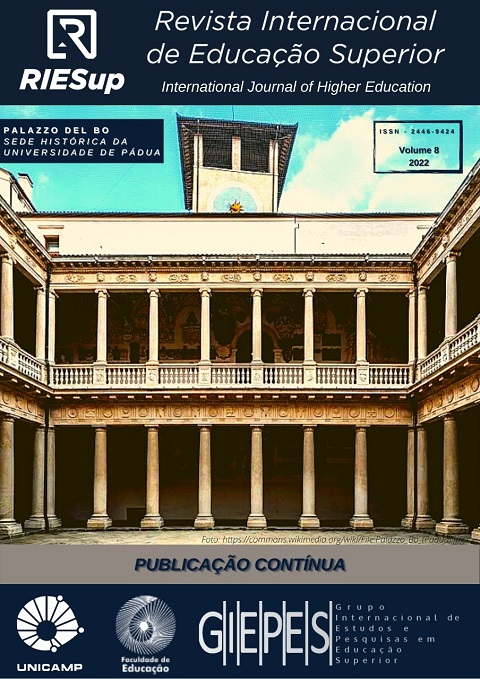Abstract
The research is carried out in the transmodern project: decoloniality in every sense. The complex objective was to analyze the technologies in the decoloniality of knowing, being, thinking, doing and dreaming as a panacea or utopia?; from critical discourse analysis as a rhizomatic transmethod in a transparadigmatic inquiry. The different colonialities are studied with the use of technologies, for later, with the analysis of interviews of six (6) collaborating doctoral students of the Postdoctorate in Mathematics Teaching at the National Experimental University of Yaracuy, Venezuela. In deeply complex structures called rhizomatics of inquiry, opening conclusions or conceptualizations are obtained: The technologies are there, they are here to stay, the world is mediated many times in favor of the human being; many others in favor of the colonial system. On whom does its humanization depend? Initially it depends on its user, who does not always have the age and maturity to differentiate the good from the bad, with a decolonial mind, free from ties, go to its ethical use protected with humanity and in favor of the community and remastering of our culture, in the respect and consideration of the Other. In the question from the title we decided for the utopia instead of the panacea; By this we mean that decoloniality with the use of technologies is a path that is possible; as well as their proper training in government policies, family and education actors.
References
DELEUZE, Guilles.; GUATTARI, Felix. Mil mesetas. Capitalismo y esquizofrenia. Valencia: Ediciones Pre-Texto, 2002.
DUSSEL, Enrique. Transmodernidad e interculturalidad: interpretación desde la filosofía de la liberación. Madrid: Trotta, 2004.
DUSSEL, Enrique. 1492. El encubrimiento del Otro. Hacia el origen del “Mito de la modernidad”. La Paz: Biblioteca Indígena, 2008.
GONZÁLEZ-SAMÉ, Héctor; ROMERO-RODRÍGUEZ, Luis Miguel; AGUADED, Ignacio. La investigación en comunicación en Latinoamérica: una aproximación histórica (1950-2016). Historia y Comunicación Social, Quito, v.22, n.2, p.427-443, 2017. Disponible en: https://revistas.ucm.es/index.php/HICS/article/download/57853/52093 Consultado el: 28 octubre 2020.
GROSFOGUEL, Ramon. La descolonización de la economía política y los estudios postcoloniales. Tabula Rasa, Bogotá, n.4, p. 17-48, 2006. Disponible en: http://www.scielo.org.co/pdf/tara/n4/n4a02.pdf Consultado el: 28 octubre. 2020.
KARAM, Tanius. Tensiones para un giro decolonial en el pensamiento comunicológico. Abriendo la discusión. Chasqui. Revista Latinoamericana de Comunicación, Quito, n.133, p.247-264, 2016. Disponible en: https://revistachasqui.org/index.php/chasqui/article/view/2680 Consultado el: 3 septiembre 2020.
LANDER, Edgardo. La colonialidad del saber: eurocentrismo y ciencias sociales. Perspectivas latinoamericanas. Buenos Aires: CLACSO, 2000.
LEÓN, Christian. Imagen, medios y telecolonialidad: hacia una crítica decolonial de los estudios visuales. Aisthesis, Chile, n.51, p.109-123, 2012. Disponible en: https://scielo.conicyt.cl/scielo.php?script=sci_arttext&pid=S0718-71812012000100007 Consultado el: 28 octubre. 2020.
MALDONADO - TORRES, Nelson. El pensamiento transmetodológico en ciencias de la comunicación: saberes múltiples, fuentes críticas y configuraciones transformadoras. Chasqui. Revista Latinoamericana de Comunicación, Quito, v.0, n.141, p.193-214, 2019. Doi::https://doi.org/10.16921/chasqui.v0i141.4076
MALDONADO - TORRES, Nelson. Walter Mignolo: una vida dedicada al proyecto decolonial. Nómadas, Bogotá, v.26, p.187-194, 2007. Disponible en: https://www.redalyc.org/pdf/1051/105115241017.pdf Consultado el: 28 octubre. 2020.
MALDONADO - TORRES, Nelson. Prácticas Comunicativas Decoloniales en la Red. Redes.com, N° 8 (131-151). 2013. Disponíble en: http://bit.ly/2g6qsZS. Consultado: 1 julio. 2020.
PADRÓN, José. Análisis del discurso e investigación social: temas para seminario. Caracas: Publicaciones del Decanato de Postgrado de la Universidad Nacional Experimental Simón Rodríguez, 1996.
QUIJANO, Aníbal. Cuestiones y horizontes: de la dependencia histórico-estructural a la colonialidad/descolonialidad del poder. Buenos Aires: CLACSO, 2014.
QUIJANO, Aníbal. Colonialidad del poder, globalización y democracia. 2015. Disponíble en: https://bit.ly/2QpqoFK/. Consultado: 1 julio. 2020.
RESTREPO, Eduardo; ROJAS, Alex. Inflexión decolonial: fuentes, conceptos y cuestionamientos. Popayás: Universidad del Cauca, 2010.
RODRÍGUEZ, Milagros Elena.. Deconstrucción: un transmétodo rizomático transcomplejo en la transmodernidad. Sinergias educativas, Ecuador, v.4, n.2, p.1-13, 2019. Doi: https://doi.org/10.31876/s.e.v4i1.35
RODRÍGUEZ, Milagros Elena. El análisis crítico del discurso: un transmétodo rizomático transcomplejo en la transmodernidad. Visión Educativa IUNAES, Durango, v. 14, n. 31, p. 117-128, 2020. Disponible en: https://anglodurango.edu.mx/web/content/6663?unique=80bd8fcfeee274be4feb2c776b29768b9f196457&download=true Consultado el: 5 diciembre 2020.
SANTANDER, Pedro. Por qué y cómo hacer Análisis de Discurso. Cinta Moebio, Chile, n.41, p.207-224, 2011. Disponible en: http://www.facso.uchile.cl/publicaciones/moebio/41/santander.pdf Consultado el: 4 septiembre 2020.
SICORENE, Daniel. Rizoma, Epistemología Anarquista e Inmanencia en la filosofía de Deleuze y Guattari. Revista de Filosofía, Maracaibo, n.87, p. 83-94, 2017. Disponible en: https://www.produccioncientificaluz.org/index.php/filosofia/article/view/31248 Consultado el: septiembre 2020.
SOCIEDADES BÍBLICAS UNIDAS. Santa Biblia. Caracas: Versión Reina-Valera,1960.
TORRICO, Erick. La “comunicación occidental” Eurocentrismo y Modernidad: marcas de las teorías predominantes en el campo. Journal de Comunicación Social, La Paz, v.3, n.3, p. 41-64, 2015. Disponible en: http://repositorio.uasb.edu.bo:8080/handle/54000/1117 Consultado el: 3 septiembre 2020.
TORRICO, Erick. La rehumanización, sentido último de la decolonización comunicacional. Aportes, La Paz, n.23, p.31-38, 2017. Disponible en: http://www.scielo.org.bo/scielo.php?pid=S2306-86712017000200004&script=sci_abstract Consultado el: 13 septiembre 2020.
VALDEZ, Orlando; ROMERO, Luis; GÓMEZ, Ángel. Matrices decolonizadoras en la comunicación para entablar un diálogo con Occidente. Sophia, colección de Filosofía de la Educación, Madrid, v.26, n.1, p. 281-305, 2019. Disponible en: http://scielo.senescyt.gob.ec/scielo.php?script=sci_abstract&pid=S1390-86262019000100281&lng=pt&nrm=iso Consultado el: 13 septiembre 2020.
VAN DIJK, Teun. Análisis Crítico del Discurso. Revista Austral de Ciencias Sociales, Chile, v.30, p.203-222, 2016. Disponible en: http://revistas.uach.cl/index.php/racs/article/view/871 Consultado el: 1 septiembre 2020.
ZOURABICHVILI, François. El vocabulario Deleuze. Buenos Aires: Editorial Atuel, 2007.

This work is licensed under a Creative Commons Attribution 4.0 International License.
Copyright (c) 2021 Revista Internacional de Educação Superior


